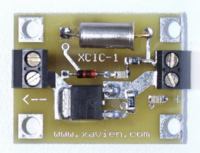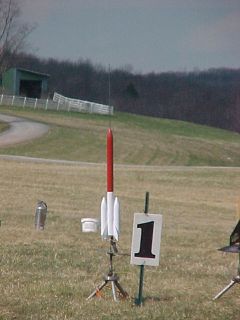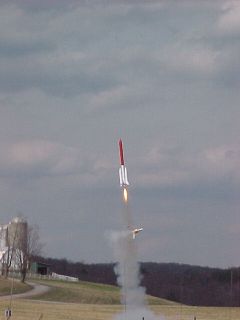| Manufacturer: | Xavien  |
Brief:
The XCIC-1 XAVIEN Cluster Igniter Controller is an air-start board that lights
igniters as soon as it detects launch. It uses a G-switch to accomplish this.
There is not a timer to adjust the moment of ignition, but the goal of this
unit is to light outboard motors at the moment of launch detection.
 Construction:
Construction:
The package arrived with a pre-wired battery holder switch. These are nice
heavy wires with pre-soldered contact ends and heat shrink tubing at all the
connections. The battery holder and switch are excellent quality.
The control board itself is a small unit measuring only 1" x 1.25" and weighs only a few grams. The board has two terminal blocks: one for the power and one for the igniters. The board has two bright surface mounted LEDs--a green one for power indication and a red one for igniter continuity. Once the board senses about 2.1Gs, it can deliver up to 10 amps peak power for three seconds using a 9V battery.
The XCIC comes with 5 pages of instructions that are clear and concise and comes with a one-year warranty.
Why use a delay timer?
The beauty in this unit is that it creates a safer launch condition. I have
seen cluster rockets where the rocket has outboard motors in the cluster that
are not strong enough to safely lift the rocket by themselves. At launch, the
weak outboards light but not the central motor. The safest cluster scenario is
to have a central motor that can safely lift the rocket by itself. Once that
central motor is lit, it's safe to light the other motors.
Another advantage to using timed ignition is being able to use various propellants. It's never a good idea to mix propellant types off the pad because of the various times it takes to light and for them to come up to full chamber pressure. Using a timer for air-starting makes this irrelevant. Let's not forget the cool factor of air-starting motors.


Flight:
In order to test this unit, I scratch built a carrier vehicle. I kitbashed two
US Rockets Aero-Roc kits and added a few additional US Rockets parts. It ended
up looking like their Sentra SRB kit. I installed the XCIC-1 and 9V battery on
a small board in the forward section of the rocket. I ran the two igniter wires
through a "tunnel" that I made from a cardboard ¼" Aerotech
igniter holder. The ejection charge from the central motor was exhausted out
the side of the rocket through a couple of ¼" holes. The outboards
were rear ejection and contained the chutes and shock cords.
For this test I used an F25-6 for the central motor and two D12-5's in the outboards. As you can see in the picture, the central motor lit, but the G-force caused one of the outboards to fall out of the back as it lifted off the pad. The cluster start board did its job because you can see the motor that fell out was lit. The other D12 did light but it can't be seen in the picture.
Summary:
Overall, this is a nice little board for a very reasonable price. Its
simplicity makes it easy to use in many applications. Its size and weight means
it can be used in small projects or be easily incorporated into large projects.
PROs: Small, lightweight and reasonably priced.
CONs: A programmable delay would make this a more versatile unit.
 |
 |